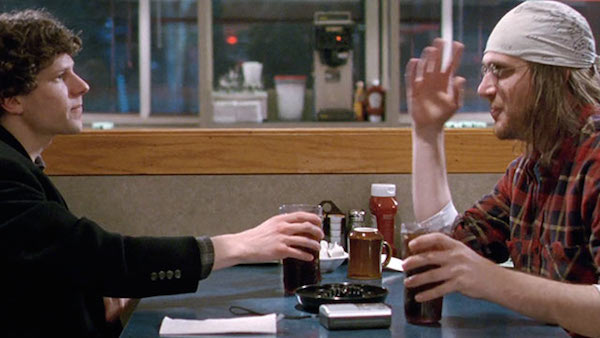review: The End of the Tour – if fame won’t make us happy, why bother?
Reading David Foster Wallace tends to be a transformative experience, the way a lot of his fans describe it. Myself included. As if someone more deeply thoughtful than yourself is reaching into your brain and rewiring it as you read, reconfiguring your thought process in order for you to be able keep up with his. You feel smarter while reading him, like you’re experiencing what it’s like to engage that intensely with big ideas. It’s a gift he has, not just writing cleverly or stylishly or densely (which he does), but doing all that in a way that is both incisive and powerful but generous to the reader. And it’s hard for anyone who’s ever written or tried to communicate their own big ideas not to be be jealous of that kind of talent and intellect.
The End of the Tour, the film that depicts journalist/writer David Lipsky’s days shadowing the man who could be this generation’s brightest new writer, tackles a lot of ‘big idea’-type subjects. Both directly, in the conversations the two characters have over their travels (and this film is almost exclusively two guys talking; about celebrity, ambition, authenticity, art, addiction, depression, junk food, etc), and indirectly, through the dynamic between them.
He’s a semi-established, aspiring-to-greatness talent still reaching for acclaim. Wallace has been crowned a genius in his own time, and is now left to deal with the weight of that. Wallace warns him that all that admiration “isn’t real”, admits that he isn’t capable of fully enjoying it. Being praised to such an extent doesn’t mean he’s arrived anywhere, or given him any sense of completion or satisfaction. Meanwhile Lipsky still feels awed in his presence, compelled to get inside his mind, to crack the code on what makes him such a singular talent. He wants to be near that brilliance. He can’t help but envy it.
After all the digressive conversations and empty calories, both are left seemingly unsatisfied. There’s a tangible sense of melancholy to the film, of no one having the answers, of a search without a solution. It’s beautiful, it’s energizing, but not without its harsh truths to face up to.
If achieving fame means being equally or possibly more miserable than you are now, is it worth the suffering to make your mark on the world, to be known and admired?
Is being happy and unknown the better goal, focusing on personal fulfillment instead of achieving greatness and renown?
